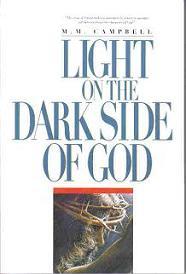God Takes Men’s Violence On Himself
 God has risked His reputation to stay in relationship with men. He is willing to appear violent, immoral, and severe in order to save us. The cross is the ultimate expression of His willingness to do this. The cross is a revelation to our dull senses of what God has always done throughout the ages in His dealings with humans. He has always been on the cross. Like Greg Boyd says, “He’s always been stooping to bear His peoples’ sin and therefore taking on a semblance that reflects the ugliness of that sin.”
God has risked His reputation to stay in relationship with men. He is willing to appear violent, immoral, and severe in order to save us. The cross is the ultimate expression of His willingness to do this. The cross is a revelation to our dull senses of what God has always done throughout the ages in His dealings with humans. He has always been on the cross. Like Greg Boyd says, “He’s always been stooping to bear His peoples’ sin and therefore taking on a semblance that reflects the ugliness of that sin.”
It is men who are violent and immoral. The apparent violence of God in the Old Testament does not reflect on Him, but on us.
Not All Biblical Revelation Is Equal
In Hebrews 10:3, Paul talks about the Old Testament law being a shadow, not ultimate Truth. A shadow can lead us to the real thing. However, we must not mistake the shadow for the real thing or we will never find the Truth. We will never find life in the law outside of Jesus. Jesus radically reframed the law, saying that the rules such as ‘eye for an eye’ were not the ideal and even distilling the Decalogue down to love. Many Old Testament rules are splinters of truth compared to the fullness that Jesus brought to the table. This means that not everything in the Bible is on an equal plane. The truth in Jesus is more complete. Gandhi is right. An eye for an eye makes the whole world blind.
Understanding God’s Dilemma
How are we to understand that all scripture isn’t on an equal plane? A look at the people that God was dealing with when the law was given tells the story. These people were violent and perverse. They were used to the ways of their neighboring nations. God’s graceful ways were completely incompatible with their standard of justice. At their level of maturity, powerful rulers were moral, and mercy (failure to punish) was immoral. For example, they insisted that death would be the penalty for disobeying Joshua (Joshua 1:18). Consequently, when Achan disobeyed God a few days later, how could God treat them according to His ideal (as seen in Jesus, centuries later)? They would reject such a weak god outright. Any god who wasn’t like the fierce, nationalistic, warrior gods of the nations around them was no god at all.
Alden Thompson clarifies God’s predicament with the story of some missionaries who went to a small tribe in Africa. Here, to their amazement, they found that men beat their wives to show them that they loved them! However, when they finally convinced some of the men that it was wrong and the men stopped, the woman wondered why their husbands didn’t love them anymore. Tim Jennings tells another story that drives the point even further home. An Iraqi grocer and his family were killed and his grocery burned down because he put celery sticks next to tomatoes, a highly offensive action because some interpreted it as depicting an erect male. Here’s the problem. If you are making laws in this town, what must the penalty be for a far more serious offense, like drunk driving, if celery sticks next to tomatoes result in death?
These stories powerfully illustrate the challenges that God had with His people and the need for intermediate steps in reaching them. So God condescended and went along with their barbaric ways, in the hope that He could bring them to a higher level of morality in the long run.
God’s Striking Condescention
Even though it’s easy to view God as inflexible and changeless, with His every word and action reflecting the absolute ideal, it becomes crystal clear why it was necessary for God to act and speak so far from His ideal in the Old Testament. Because the morality of the people was so far removed from His ideal, the way He dealt with them in the Old Testament little resembled what He really desired (as seen through the lens of Christ). It made Him look violent and unloving. It made Him look like a lair. Yet God desired to stay in a relationship with us despite how bad such actions made Him look. This radical condescension was necessary to bring his people out of moral darkness. He couldn’t do it all at once. He needed to acclimate them to truth in degrees, like a sunrise.
A More Complete Truth
Hosea 10 and 11 describe how God felt all along as He bore patiently with men: His insides churned in protest! Indeed, the Old Testament stories don’t reflect negatively on God, but on us! We ruined His reputation! But Jesus came and set all of that straight. He told a story that we had completely missed in the Old Testament. He presented a more complete, unsplintered truth.
“When we see Bible authors ascribing violence directly to God, there we’re seeing God wearing a mask. There we’re seeing the Spirit of God being suppressed. There we’re seeing God humbling Himself and saying, ‘Despite the fact that you think I’m capable of this horrendous violence, despite the fact that you think I’m a typical ancient eastern warrior god, out of My love and faithfulness I’m going to stay with you, and I’m going to keep working with you. I accept you just as you are.’
“And so, as we look through the lens of the Cross, all of those portraits of God engaging in and commanding violence become literary crucifixes. They’re testaments to the truth that God has always been doing what He does in a supreme way on the cross. He’s always been stooping to bear His peoples’ sin and therefore taking on a semblance that reflects the ugliness of that sin.”
– Greg Boyd
What a dilemma God is in! Yet what can He do when our sense of justice is so warped? God has continually taken our violence on Himself, even when it makes Him look bad. Yet all it takes is a look at the more complete revelation of God in the face of Jesus to know the truth about Him.











